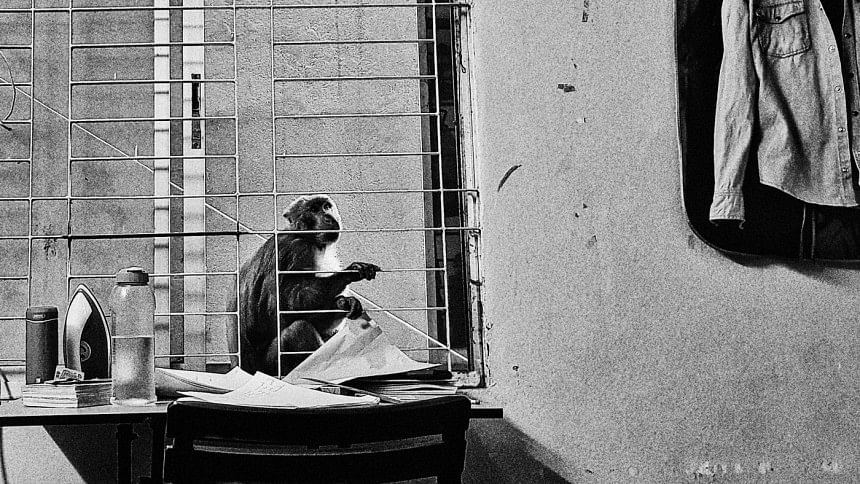‘Longitude Latitude 8’ showcases versatile artworks through online exhibitions

A month-long online art festival, 'Longitude Latitude 8,' directed and curated by Shehzad Chowdhury is currently underway. 'Longitude Latitude,' which started from 2003, is an art happening that takes on many forms—from festivals to exhibitions. This time, it took the form of an online festival for its 8th edition.
The festival started on October 23 and will conclude on November 22. However, since the artworks are exhibited online, they will be available afterwards as well.
"The theme of this edition is Parampara and Prakriti. It's a collection of incredibly sincere and personal works in the middle of a global crisis," shares Shehzad Chowdhury. "We have created a community of creative individuals who shared their stories. We can't thank them enough."
The event features an array of talented artists with more than seventy contributors hailing from Bangladesh as well as other parts of the world. The festival invited some guest curators to curate some individual segments. They include Kazi Tahsin Agaz Apurbo, Fahad Al Alam, Sadya Mizan, and Nuzhat Tabassum, among others.
Curated by Kazi Tahsin Agaz Apurbo, "Exhale," features six different bodies of art: "Facing Injustice," by Shahzaad Raja, "Under the Skin," by Debashish Chakrabarty, "Living with Uncle Sam," by Ata Mojlish, "Remnants," by Fahad Al Alam, "The room is dark" by Parna Sira and "Breathe," by Orchid Chakma and Yashab Osama Rahman.

Apurbo is an artist, a curator and a journalist, currently working as the executive director of Dwip Gallery and founder and curator of Ghartyara.

"Exhale is a boundless wander-land of a few sedimentary thoughts scuffled in alien times," expresses Kazi Tahsin Agaz Apurbo.
"Under the Skin" by Debashish Chakrabarty is a series of drawings, which combines political posters and modern memes into recent political events, while "Facing Injustice" by Shahzaad Raja reflects the current political and social climate around the world.
Ata Mojlish's "Living with Uncle Sam," portrays the artist's attempts to survive while struggling to fit in a capitalist society. Ata Mojlish is a Texas-based Bangladeshi visual artist.
The installment, "Breathe," by photojournalist Orchid Chakma and satirist Yashab Osama Rahman, shows pictures of different animals among the chaos of city life, representing everyday entrapments. "No matter what you are or whatever it is that you do, we all feel suffocated, making it difficult for us to breathe," shares Yashab Osama. He further explains that the animals, who are supposedly free are also trapped by certain circumstances or by the environment humans created.
"The possibilities are endless in an online exhibition. Unfortunately, due to lack of resources and patronage, we cannot fully utilise the advantage of an online initiative," shares Apurbo.
Curated by Sadya Mizan, the photographic representation of "URONTO Residential Art Exchange Programme," aims to reconnect with lost memories of forgotten places through diverse contemporary artistic interventions. Sadya Mizan is a researcher and arts manager, currently working on art infrastructure in different locations.
Sadya is also working on a compilation vlog, "V(isual)LOG" for Longitude Latitude 8. "This vlog is an attempt to bridge the gap between artists coming from different backgrounds," shares Sadya. "We aimed to encourage the young artists who are regularly practicing art, to get to know them and also to let them know about the platform."
She is the founding member of URONTO Artist Community, which is an artist-led open collective in Bangladesh, founded in 2012. Through photographs from different parts of the country, URONTO creates opportunities to share the joy of connecting to cultural histories through co-existing and co-creating.
Curated by Fahad Al Alam, "Lockdown Days," explores three artists' perspectives and outlooks on the ongoing pandemic. Asadur Rahman, Inan Anjum Sibun and Sarika Siraj participated in this segment.
Asadur Rahman's "The Longing," explores the urge of finding the meaning of existence and a sense of belonging.
"My paintings and sketches include colours from monotonous city life, the absurdity and complexities of existence. I find absolute beauty in the chaotic side that we constantly want to hide from each other," shares Inan Anum Sibun, a student of Bangladesh University of Engineering & Technology (BUET), about her work.
Sarika Siraj's photography series reflects on living in a foreign country during a pandemic, as she captures the elements of nature in her camera. "I started to go out with my camera conversing mostly with myself and the sole beings around me," shares Sarika, an architect, writer and photographer, passionate about traveling. Currently based in Berlin, she is in the process of developing her work "Wanderkite", a narration of a solo woman traveller in a patriarchal society.
"We wanted to portray what the artists were feeling— their emotions, struggles, nightmares during a pandemic and how they are observing the whole situation," expresses Fahad, a faculty member of Pathshala, photographer and poet. In May 2018, he published his photography and poetry book "A piece of whisper," consisting of a compilation of his analogue works and poetry since 2013.
"The best part of an online exhibition is its accessibility. Anyone can view the works and the artist's presence in the venue is not necessary," shares Fahad. "We want to expand and explore the possibilities of online exhibitions further to make the experience more accessible and exciting."
The festival is also exhibiting a previously curated exhibition called "Immersion- Doob" curated by Azizee Fawmi Khan, which was initiated in July 2020. Nuzhat Tabassum is also curating two daily segments, "Bagan Bilash" during sunrise and another during sunset, in which she explores and experiments with the different elements of nature.

 For all latest news, follow The Daily Star's Google News channel.
For all latest news, follow The Daily Star's Google News channel. 



Comments